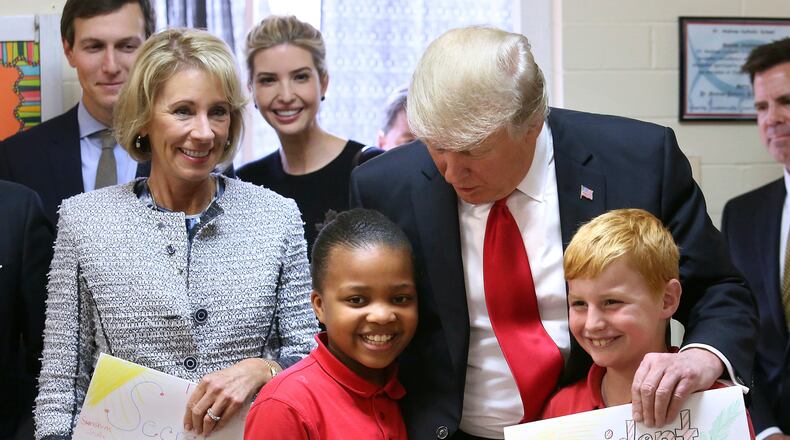At a recent forum in Atlanta, labor organizer and MacArthur genius grant winner Ai-jen Poo identified a mistake public policy advocates make when trying to win converts. I felt her comments capsulized the challenges that education advocates face in building a case for public schools.
"We, as policy people, talk about hearts and mind, but what we mostly know how to do is change minds with data and with analysis," said Poo, who, as director of the National Domestic Workers Alliance, seeks to improve the working conditions for domestic or private-household workers.
“We don’t put nearly enough energy into the hearts part of it. We leave that entire emotional life — that heart space — for somebody else,” she said. “We have to realize we are contending for the soul of what it is we are fighting for in the hearts and minds of people.”
Before Poo took the stage at the Georgia Budget & Policy Institute Insights 2019 conference on Friday, I talked to state school Superintendent Richard Woods, who was also there to address non-profit leaders, public policy makers and elected officials.
Woods and I discussed the renewed push for expanded school choice in Georgia by Lt. Gov. Geoff Duncan. How, I asked, would Woods counter the narrative that Georgia families need alternatives to lagging public schools? By spreading the word about public school progress and improvements, said Woods, ticking off Georgia's rise in SAT/ACT scores, its 16th place ranking in the nation for Advanced Placement test performance and the growth in high school graduation rates.
“We have to work harder to get the word out about all the positive things happening with Georgia public schools,” said Woods.
The contention that public education is failing owes to our changing expectations for our schools. No one summed it up better than the late education guru Phillip Schlechty, author of "Working on the Work," while in Atlanta a few years ago. "Schools were designed to send 10 percent of students to college. In 1960, half the kids didn't drop out of high school —- because they didn't come to school. They got through eighth grade and left. Schools are much better than they used to be at what they used to do, but we don't want them to do that anymore."
Despite positive trend lines in Georgia, lawmakers continue to promote escape hatches from public schools that divert tax dollars to the private sector, such as enacting education savings accounts and expanding the private school tax credit. And that’s partly because public school advocates are telling an incomplete story.
While adept at laying out policy arguments, they haven’t been as effective in trumpeting the heart-tugging stories of how public schools have raised up students, changed trajectories and sustained communities. Proponents need to relate how public schools are succeeding through the experiences and testimony of students.
At any school choice rally, a parade of parents and kids will tearfully share the benefits they gained from a private school voucher or a scholarship funded by tax credits. (Often, there will also be busloads of kids from choice schools in matching shirts.) U.S Education Secretary and choice advocate Betsy DeVos burnished the personal anecdote into an art form in her speeches around the country, sometimes heralding the inspirational story of a voucher or tax credit scholarship recipient in the audience.
Georgia lawmakers haven’t helped. There are still legislators who disdain “government schools” under the assumption “government” taints anything it touches. (Yes, irony abounds that people who dedicate themselves to winning leadership roles in government denigrate the institution once elected.) When these lawmakers question with derision why anyone would trust their children’s education to the government, they never go further and ask, for that matter, why anyone would leave national defense, food inspections or highway building to the government?
The answer is the same for all these taxpayer-supported endeavors: Because, as a nation, we’ve agreed these services are critical to our democracy and that we collectively ought to support them because they make us better, safer and smarter.
Supporting public education doesn’t mean you can’t advocate for change. Nor does it mean you can’t press for innovations or new models. But what should be preserved and protected is the foundational belief public education strengthens communities, instills a sense of common history and culture, and creates citizens able to participate and thrive in civic and work life.
About the Author
The Latest
Featured



